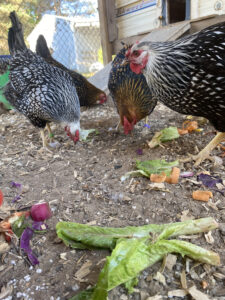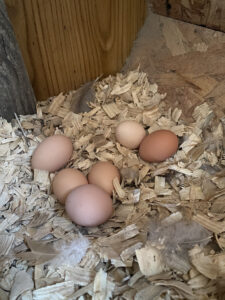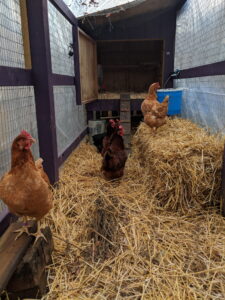Push resumes to permit raising chickens in Escanaba
- Chickens eat food scraps in a coop in Jackson County in lower Michigan. Some Escanaba residents want to be allowed to keep chickens of their own within city limits. (Courtesy photo)
- Most people who want to keep chickens in the city claim it’s for the food security of fresh eggs. (Courtesy photo)
- A small backyard chicken coop is shown. A draft ordinance written by City of Escanaba staff two years ago suggested a minimum coop size of 4 square feet per chicken. It was not adopted and keeping chickens remain illegal in Escanaba. (Courtesy photo)
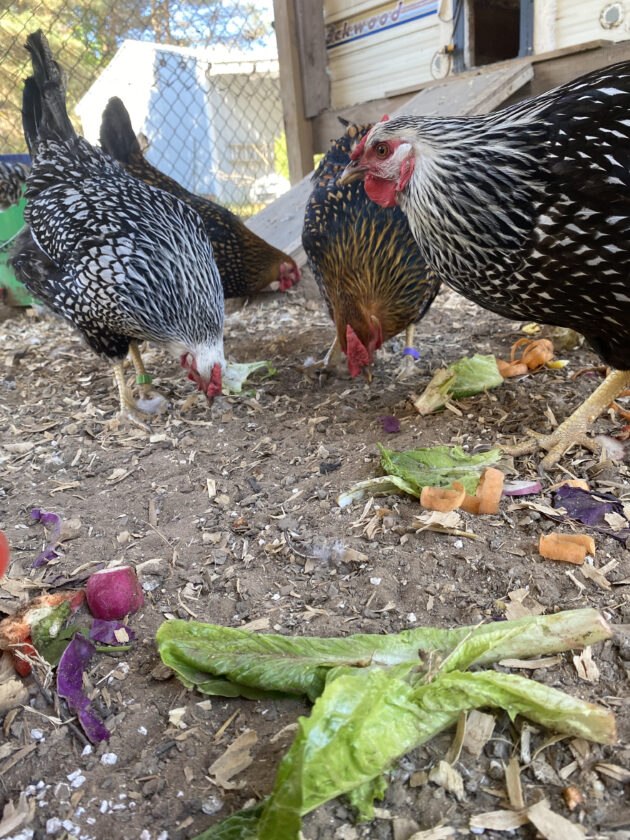
Chickens eat food scraps in a coop in Jackson County in lower Michigan. Some Escanaba residents want to be allowed to keep chickens of their own within city limits. (Courtesy photo)
ESCANABA — Almost two years after an ordinance to allow residents to keep chickens and ducks in Escanaba died before city council, an effort has resurfaced to to make raising fowl legal in the city.
Announcing his intention to do further research, resident Jalen Sims spoke to the Escanaba City Council during public comment at the last regular meeting Oct. 2 to ask the city’s elected officials reconsider the issue and express why he thought Escanabans should have the right to keep egg-laying hens. Since then, he’s started an online petition and plans to address the council again this week.
“I think it’s pretty important to support people who are interested in homesteading and sustainability … It’s important for residents to be able to have the ability to supply for themselves, not be forced to go to the grocery store,” Sims said at the Oct. 2 meeting.
Other Escanaba residents are of the same mindset as Sims. Several have been found to be raising chickens illegally in recent years.
Because of the number of violations, the Escanaba Planning Commission in late 2023 sought to find out whether it was practical and desirable to amend the code of ordinances.
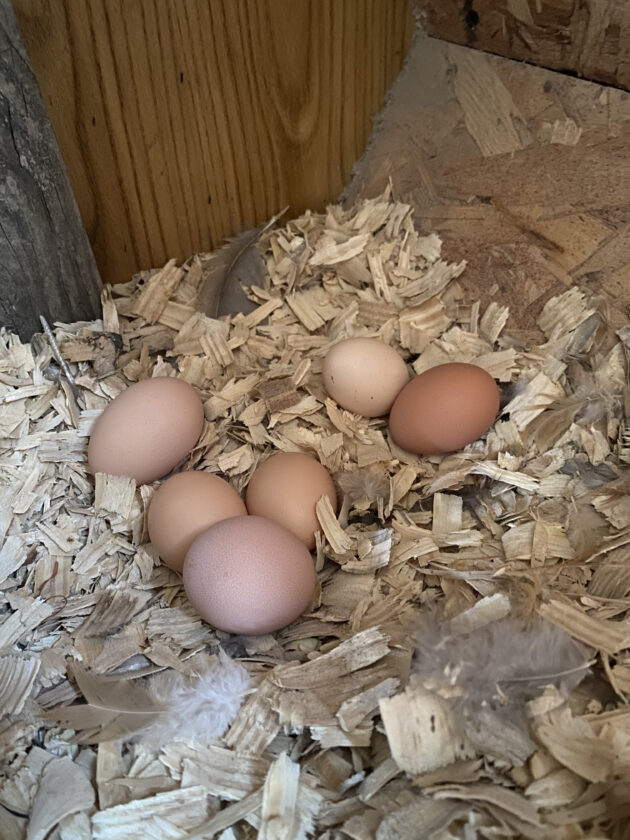
Most people who want to keep chickens in the city claim it's for the food security of fresh eggs. (Courtesy photo)
On Oct. 12, 2023, the planning commission had a public hearing on a draft ordinance that had been based on guidance from the Michigan Department of Agriculture and Rural Development, or MDARD, and language from other cities that allow citizens to keep fowl.
The draft included some of these stipulations: Residents would have to pay a $50 permit fee to keep chickens and/or ducks. No roosters would be allowed, nor Muscovy ducks. The maximum number of birds was six. Enclosures must be at least 20 feet from a neighboring dwelling. Minimum enclosure size was 4 square feet per chicken. Animals must be kept in good health.
The hearing brought both dissent and support. Opponents were concerned with public health, odor, noise and welfare of the birds. Supporters spoke of food security and 4-H opportunities for children living in town.
The planning commission didn’t make a decision at that first hearing, opting instead to wait for a few more questions to be answered. When the matter was brought up again at the next monthly meeting on Nov. 9, 2023, four of the seven commissioners voted in favor of the draft ordinance. Later, all of them unanimously voted to recommend the city council adopt the ordinance, which propelled the question into the hands of the higher five-member board.
The paperwork presented to council included research and the public input on the matter: Of the citizens who had written in or spoken up, 10 were in favor of allowing chickens, and six were against.
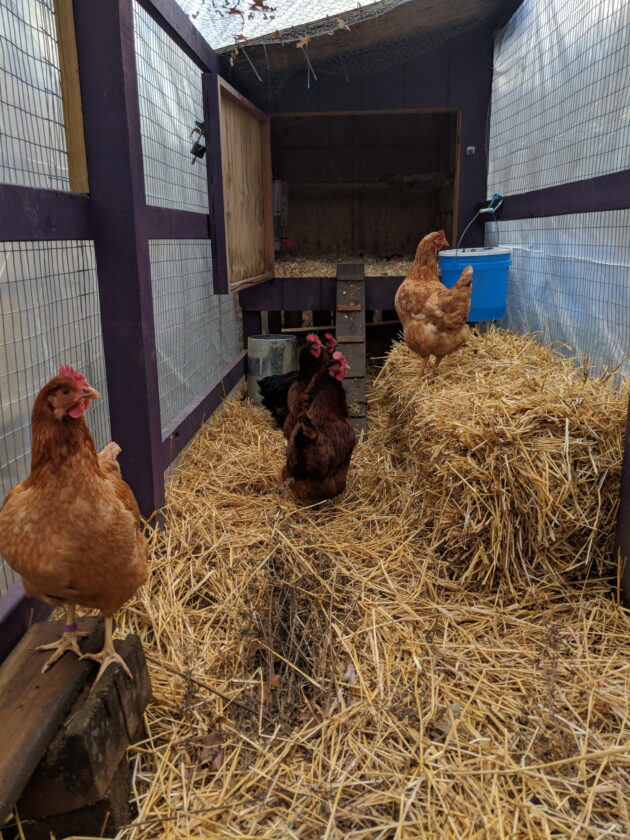
A small backyard chicken coop is shown. A draft ordinance written by City of Escanaba staff two years ago suggested a minimum coop size of 4 square feet per chicken. It was not adopted and keeping chickens remain illegal in Escanaba. (Courtesy photo)
Escanaba City Council was presented with the information and proposed chicken and duck ordinance on Dec. 7, 2023. Though council entertained some discussion, when Council Member Karen Moore moved to progress and schedule another hearing, the lack of a second effectively killed the motion on the floor. The suggested second hearing never happened.
A few months later, a resident started an online petition in March 2024 that gathered 55 signatures but remains hanging in the ether of the internet.
Although chickens remain illegal in Escanaba, some people maintain coops. Code Enforcement Officer Erik Bessonen said that he’s aware of two chicken complaints that reached his desk this year.
While some almost certainly realize they’re violating the current city ordinance, others may not. When the city discovers and documents a violation, the enforcement process is to first give a notice of violation and allow the offender a period to rehome the chickens before citations (fines) are issued.
“Citizens do get frustrated with the ordinance restrictions within the city,” Bessonen said.
Sims, who moved to Escanaba in August 2024, is determined to change that. About a week and a half after he spoke at the Oct. 2 City Council meeting, he also started a petition using the same platform. Hosted at www.change.org/p/update-escanaba-ordinances-to-allow-backyard-chickens, the petition, which asks people to urge the city “to update local ordinances to allow backyard chickens,” has accumulated 77 signatures in five days.
“Allowing homeowners to responsibly own and care for backyard chickens would promote sustainability, strengthen our local food system, and empower families to live more self-sufficiently,” Sims wrote in the petition. “… Chickens are incredible partners in reducing waste, as they consume food scraps and produce nutrient-rich manure, decreasing the community’s overall environmental footprint. Moreover, fresh eggs from backyard chickens are healthier, more nutritious and have a smaller carbon footprint compared to commercially produced eggs.”
The next Escanaba City Council meeting is at 7 p.m. Thursday, and Sims intends to bring forward what he has learned since he last addressed the board. He hopes others will join him as well.
“As people, we have the right to demand that our government see to our best interests, and if enough of us say that this is in our best interest, then they should have to at least bring up the topic for a vote,” Sims said.
Since the topic is not scheduled as an agenda item Thursday, Sims will again speak during the public comment period, urging the council consider review chicken ownership in the city. As per the Michigan Open Meetings Act, council will not be allowed to make a decision Thursday, as notice must be given beforehand.
If the council ends up rejecting the idea of chickens in Escanaba, Sims said he would look into other routes forward, including possibly circulating a formal petition for a referendum to bring it to a public vote.
———
R. R. Branstrom can be reached at 906-786-2021, ext. 140, or rbranstrom@dailypress.net.

